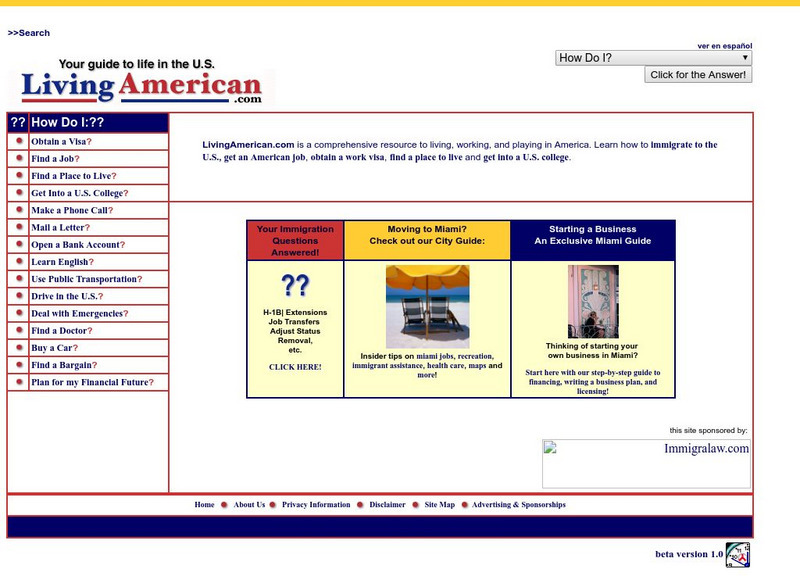National Earth Science Teachers Association
Windows to the Universe: The Geography of Land Planning
For this lesson, young scholars learn the basics of town planning. They must ensure that the town has adequate water and other resources, and that it takes into account other nearby communities. There is a fair amount of preparation...
Colorado State University
Csu Writing Guides: Peer Review
A detailed account of how to improve one's writing through the process of the peer review. Includes basic information and content-specific additions, such as peer review guidelines, questions, and online resources.
MsMoney
Ms Money: Deciphering Your Bank Statement
This site explains the items that appear on a bank statement and also includes procedures for reconciling a bank statement. Click on the headings for more information. Also, explore the additional financial topics by clicking menu items.
TeachEngineering
Teach Engineering: Navigating by the Numbers
In this lesson, students will learn that math is important in navigation and engineering. Ancient land and sea navigators started with the most basic of navigation equations (Speed x Time = Distance). Today, navigational satellites use...
Other
How Do I? A Practical Guide to Living in America
Miami-based law firm, Immigration Law Offices, Inc., provides information for new immigrants about basic tasks, such as finding housing, making phone calls, mailing letters, opening bank accounts, learning English, finding a doctor, and...
Northern Illinois University
Ishs: The Espionage and Sedition Acts of 1917 and 1918 [Pdf]
From the 1994 spring volume of the Illinois Historical Journal comes this interesting and somewhat shocking account of how those who did not agree with the U.S. involvement in World War I were treated. Read how the basic right of freedom...
Council for Economic Education
Econ Ed Link: The Changing Face of Money
In this instructional activity, students play a game to guess which objects have been used as money throughout history. In the process, they learn several basic economic concepts. For instance, money must be a unit of account, meaning...
Other
Sumdog Teacher Portal: One More, One Less
This engaging lesson plan introduces young scholars to basic addition and subtraction by adding or subtracting one. Teachers can create a free Sumdog account and usernames for their students to practice the skills through online learning...
Khan Academy
Khan Academy: Networking Through Social Media
Social media can be a powerful tool to build and maintain your professional network. Learn basic tips to ensure your accounts are professional and create a positive first impression.
iCivics
I Civics: Gideon v. Wainwright (1963)
This mini-lesson covers the basics of the Supreme Court's decision that gave defendants in state criminal courts the right to a lawyer. Students learn about the 6th Amendment right to a lawyer, why the right is important, and how the...
iCivics
I Civics: Clapper v. Amnesty International (2013)
This mini-lesson covers the basics of the Supreme Court's decision that determined the government's ability to conduct electronic surveillance of its citizens. Students learn about the First Amendment right to free speech, the Fourth...
iCivics
I Civics: Hazelwood School District v. Kuhlmeier (1988)
This mini-lesson covers the basics of the Supreme Court's decision that established a school principal's right to censor student articles in the school newspaper. Students learn about the limits on student free speech in a school...
iCivics
I Civics: Korematsu v. United States (1944)
This mini-activity covers the basics of the Supreme Court's decision that determined the government acted constitutionally when it detained people of Japanese ancestry inside internment camps during World War II. Students learn what...
iCivics
I Civics: Plessy v. Ferguson (1896)
This mini-lesson covers the basics of the Supreme Court's decision that it was constitutional to keep black and white people segregated as long as the accommodations for each race were "equal." Students learn about the concept of...
iCivics
I Civics: Minersville v. Gobitas (1940)
This mini-lesson covers the basics of the Supreme Court's decision that allowed schools to require students to salute the flag and recite the Pledge of Allegiance. Students learn about the First Amendment and how the interests of...
iCivics
I Civics: Gibbons v. Ogden (1824)
This mini-lesson plan covers the basics of the Supreme Court's decision that interpreted the Commerce and Supremacy Clauses of the U.S. Constitution and affirmed the federal government's superiority with regard to its enumerated powers....
iCivics
I Civics: u.s. V. Nixon (1974)
This mini-lesson covers the basics of the Supreme Court's decision that then-sitting President Nixon had to turn over some recordings of his presidential communications to a court of law. Students learn about the Watergate break-in, the...
iCivics
I Civics: Dred Scott v. Sandford (1857)
This mini-instructional activity covers the basics of the Supreme Court decision that determined that Dred Scott, having lived in a free territory, was not entitled to his freedom. Students learn about the impact of the Court's decision,...
iCivics
I Civics: West Virginia State Board of Education v. Barnette (1943)
This mini-instructional activity covers the basics of the Supreme Court's decision that it was unconstitutional for a state to force students to salute the flag and recite the Pledge of Allegiance. Students learn how the interests of...
iCivics
I Civics: Bethel School District v. Fraser (1986)
This mini-instructional activity covers the basics of the Supreme Court's decision that established a school's ability to prohibit inappropriate student language on campus. Students learn about the First Amendment right of free speech,...
iCivics
I Civics: In Re Gault (1967)
This mini-lesson covers the basics of the Supreme Court's decision that said juvenile offenders have a right to due process. Students learn about 14th Amendment due process, fairness, and the specific rights afforded juveniles in the...
iCivics
I Civics: Texas v. Johnson (1989)
This mini-lesson covers the basics of the Supreme Court's decision that burning the American flag is a form of political speech protected by the First Amendment. Students learn about the First Amendment freedom of speech and the...
iCivics
I Civics: Tinker v. Des Moines (1969)
This mini-lesson covers the basics of the Supreme Court's decision that extended First Amendment protections to students in the classroom. Students learn about the concept of symbolic speech and how students gained the right to engage in...
iCivics
I Civics: Miranda v. Arizona (1966)
This mini-lesson plan covers the basics of the Supreme Court's decision that prohibited a suspect's statements from being used as evidence unless the suspect has been advised of his or her rights to remain silent. Students learn about...
Other popular searches
- Basic Accounting Equation
- Basic Accounting Concepts
- Basic Accounting Jeopardy
- Basic Accounting Curriculum
- The Basic Accounting Cycle
- Basic Accounting Cycle







![Ishs: The Espionage and Sedition Acts of 1917 and 1918 [Pdf] Handout Ishs: The Espionage and Sedition Acts of 1917 and 1918 [Pdf] Handout](https://d15y2dacu3jp90.cloudfront.net/images/attachment_defaults/resource/large/FPO-knovation.png)
